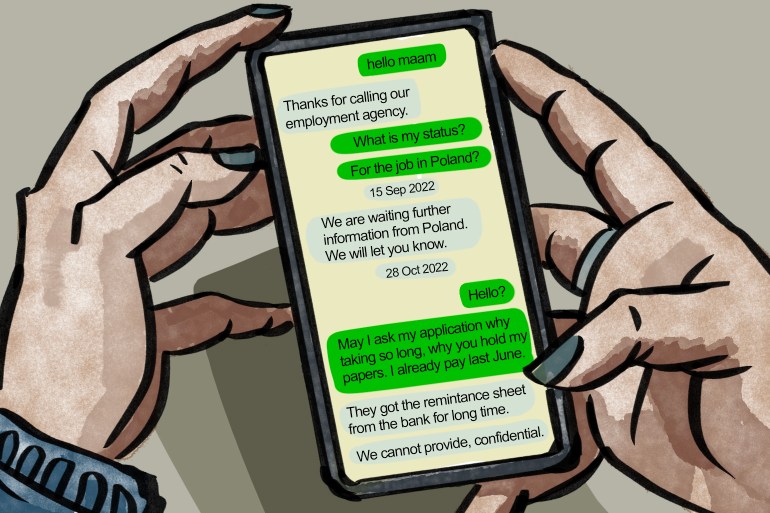This is the second article in a two-part series about the alleged exploitation of Filipino migrant workers.
Hong Kong, China – It only took a few minutes of searching online for Divina*, a domestic worker in Hong Kong, to find a recruiter offering the tempting opportunity to work in Poland.
Before long, Divina found herself attending a two-hour orientation session on the 17th floor of a building in the city’s bustling Mong Kok district.
There, she listened as agents listed opportunities in workplaces ranging from hotels to a chicken processing plant and a car parts factory.
“So you would really be convinced that [they] had many contacts in Poland,” she told Al Jazeera.
Divina paid the recruiters 10,000 Hong Kong dollars ($1,279) to initiate her application to work in Europe.
But more than 14 months later, Divina is still waiting for her application to be finalised and has all but given up hope of ever reaching Poland.
Divina is one of at least dozens of domestic workers in Hong Kong who feel cheated after paying thousands of dollars in fees for jobs in Poland that haven’t materialised.
Labour advocates in the financial hub say that the victims of an international network of recruiters and agencies have lost at least 600,000 Hong Kong dollars ($76,785) – but that is likely to only be the tip of the iceberg.
Al Jazeera spoke with five Filipino domestic workers in Hong Kong and read written statements from 20 others who claim to have been deceived by online recruiters and at least two agencies in Hong Kong that worked with a Poland-based agency.
Many said they were unable to support their families for months after taking out loans to cover the recruitment fees.

Such cases are far from unique in Hong Kong, which has become a “hotbed for illegal recruitment schemes” due to its 340,000-strong population of foreign domestic workers and the growing demand for migrant workers from Asia to Eastern Europe, according to David Bishop, a university professor and co-founder of the migration-focused social enterprise Migrasia.
Bishop said his team has identified a large number of agencies that engage in third-country recruitment strategies prohibited by Philippine labour authorities.
“These agencies target Filipino workers in Asia with the alleged intention of placing them in jobs in Europe,” he told Al Jazeera, adding that recruiters play on the despair of people hoping to find work opportunities.
A few weeks after her application, Divina was informed that a Warsaw-based agency would be solely responsible for handling her application. The partner agency in Hong Kong that she dealt with directly told her it was no longer involved.
Ultimately, the Polish agency claimed it had not received her payment.
Divina, who is legally required to live with her employer in Hong Kong and often works 16-hour shifts without overtime, was at a loss for what to do next.
“I keep praying, I keep begging [to get back] all our hard-earned money,” she said, adding that while she hopes to get a refund, she still dreams of going to Poland.
Recruitment agents have sold Poland to domestic workers as a country that offers higher salaries – sometimes more than double – better working conditions, and the opportunity to live together with their families in Europe.
After the Philippines, Hong Kong was the top source of visa applications by Filipinos hoping to work in Poland from 2021 to November 2023.
Polish authorities in Hong Kong processed 2,980 visas for Filipino workers over the period, according to a spokesman for Poland’s Ministry of Foreign Affairs.
Searching for answers
Maria*, another Filipina migrant worker who applied for a job in Poland with the Mong Kok-based agency, has also been left searching for answers.
“I don’t know where my 10,000 Hong Kong dollars went,” she told Al Jazeera, referring to the first cash instalment she made in May 2022.
Maria said she was told her full application would cost 30,000 Hong Kong dollars (US$3,839) – more than six times the monthly minimum wage of a domestic worker in Hong Kong.
“I thought that because we were using an actual agency in Hong Kong, we would be more protected,” she said.
Maria cannot understand why she remains in the city, while another worker she knows who applied with the same agency at the same time was offered a job and successfully reached the Eastern European country.
In WhatsApp messages seen by Al Jazeera, Maria asked the Hong Kong agency for proof that her money had indeed been sent to Poland, but was told that was “confidential [information] between companies”.
In November 2022, the agency – which currently holds a licence to operate in the city – sent a letter to applicants, claiming that “all the problems” were “from the Poland side”.
When Al Jazeera accompanied Maria on two visits to her agency in Mong Kok last month, the office was closed each time.
A person who answered a number posted on the door questioned why Maria had decided to go there in person, insisting queries be sent over WhatsApp.
Despite repeated efforts, Maria has been unable to meet with anyone from the agency in person.

The Philippine Consulate in Hong Kong had recorded 24 formal complaints against a Poland-based agency, CIS Group Manpower, as of the end of November – 18 of which named Son Employment as its Hong Kong partner.
“Almost all stated they have paid significant amounts [ranging from] 10,000 to 30,000 Hong Kong dollars to the recruiter, only ending up not being able to leave for Poland,” Raly Tejada, who served as Consul General until last month, told Al Jazeera.
The owner of the CIS Group Manpower, Imran Mehmood, said he leads an “honest” agency that follows Polish regulations and denied defrauding or overcharging workers.
Mehmood said his firm was no longer working with Son Employment and claimed that he had been “cheated” by its owner. He did not offer details about their falling out.
A spokesman for Hong Kong’s Labour Department said Son Employment ceased operations on May 31, 2022, and had its licence cancelled soon after.
Kenneth Tang, Son Employment’s former owner, rejected Mehmood’s accusations and claimed he was “a victim” of CIS Group Manpower himself. He also did not elaborate on the souring of their business relationship.
Tang said he reimbursed dozens of Filipino workers who reported problems with their applications for Poland.
“I refunded some money to applicants if they had good reasons – but, of course, maybe 40 percent,” he said, adding that he could not provide full refunds because payments had already been made to the partner agency in Poland.
Tang, who said he now works as an adviser for another employment agency in Hong Kong, declined to disclose how much he charged migrant workers or how many used his services.
He claimed that employment agencies were losing money because “six out of eight” Filipino workers abscond from their job after arriving in Poland, without offering evidence in support of his claim.
Fear of coming forward
Isla Wilson, programme manager at Migrasia, estimated that at least 200 Filipinos, mostly in Hong Kong, have been deceived.
“This is the most extensive recruitment network we have investigated to date,” Wilson told Al Jazeera.
Wilson said her team has assisted more than 30 clients in Hong Kong and the Philippines in submitting claims surpassing 600,000 Hong Kong dollars (US$76,785).
“However, we estimate that the agencies have earned a significantly higher amount from their illegal services, as some victims chose not to file a complaint or still hold out hope for deployment,” she said.
Maria did not make an official complaint due to her reluctance to deal with bureaucracy in her limited free time and because it is illegal under Philippine law to be hired directly from Hong Kong to a third country.
In a 51-page report submitted to authorities in Hong Kong, Poland and the Philippines in April last year, Migrasia said employment agencies prevented applicants from making “truly informed choices” and placed them at “risk of labour exploitation”.
Migrasia said it found several violations of Hong Kong’s Trade Descriptions Ordinance, including false or misleading representations, unfair commercial practices and the collection of exorbitant fees.
A spokesman for Hong Kong’s Labour Department said that, even if the employment is to take place outside the city, agencies must be licensed and can only charge up to 10 percent of the worker’s monthly salary after placement.
He did not clarify if the department had received complaints specifically related to recruitment in Europe.
A spokesman for the Hong Kong Police Force declined to confirm if it was investigating the recruitment network for potential breaches of the law.
Diplomat Tejada said he discussed third-country recruitment in Hong Kong with his Polish counterparts in the city and raised the possibility of a bilateral agreement to address the issue.
“It is our view that the negotiation of a formal bilateral labour agreement is the viable answer to the current issues affecting Filipino workers in Hong Kong being recruited for jobs in Poland,” Tejada said.

Shiella Estrada, vice chairperson of the Progressive Labour Union of Domestic Workers in Hong Kong, said she was worried about the large loans being taken out by domestic workers applying for jobs in Poland.
Estrada urged the Philippine authorities to raise awareness among domestic workers and called on the Hong Kong government to inspect agencies recruiting for the European country.
“Agents in Hong Kong point fingers at those in Poland. Those in Poland point fingers at those in Hong Kong. We saw this happening before,” Estrada told Al Jazeera.
Wilson, of Migrasia, said agencies and recruiters in both countries that do not follow regulations should face consequences, including the revocation of their licenses in some cases.
Most importantly, Wilson said, anyone who has been victimised should receive compensation “as financial restitution is vital for them to achieve complete justice”.
This article was supported with funding from Journalismfund.eu.
*Names have been changed to protect individuals’ privacy.
Sumber: www.aljazeera.com
 Skip to content
Skip to content

